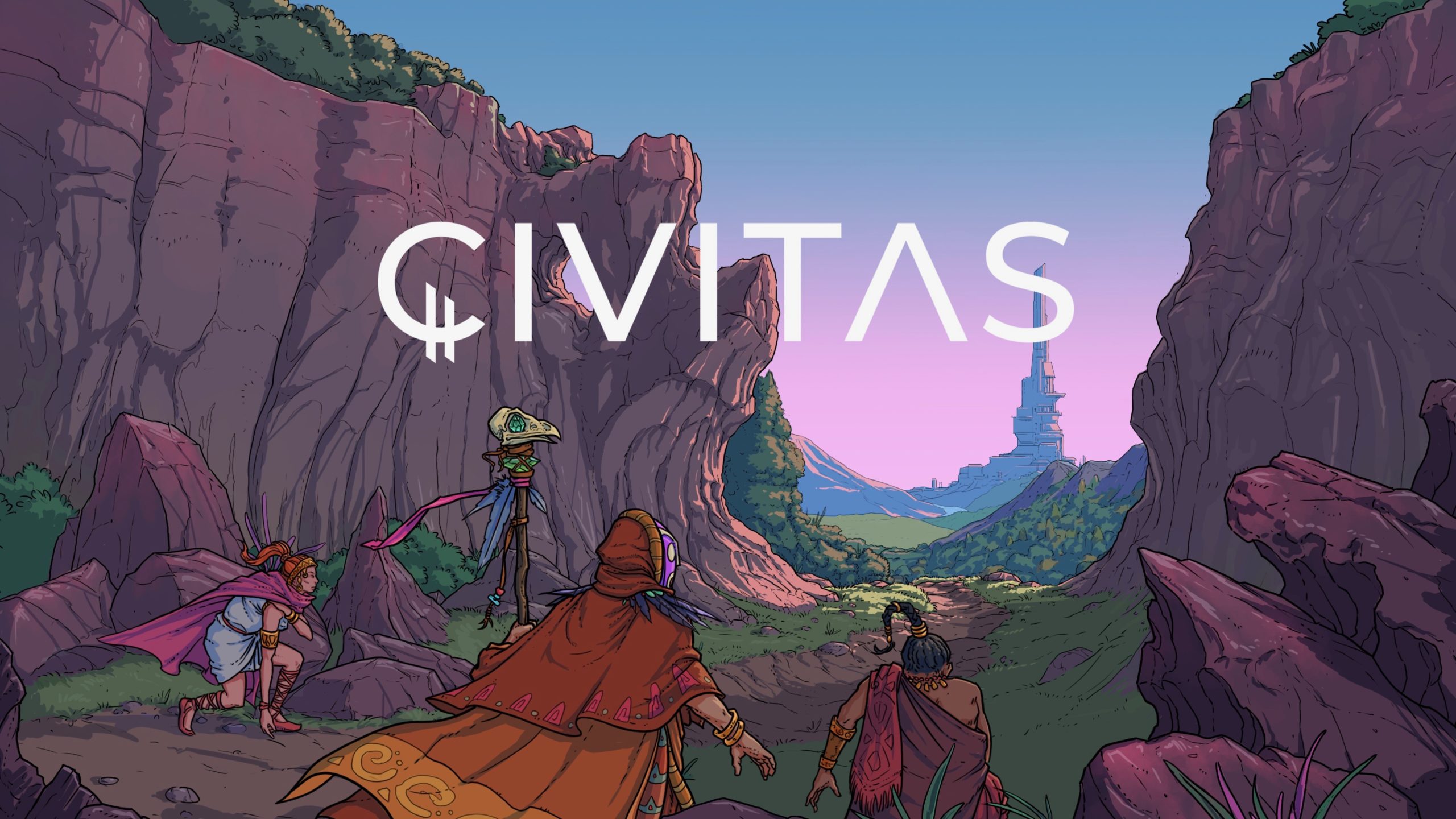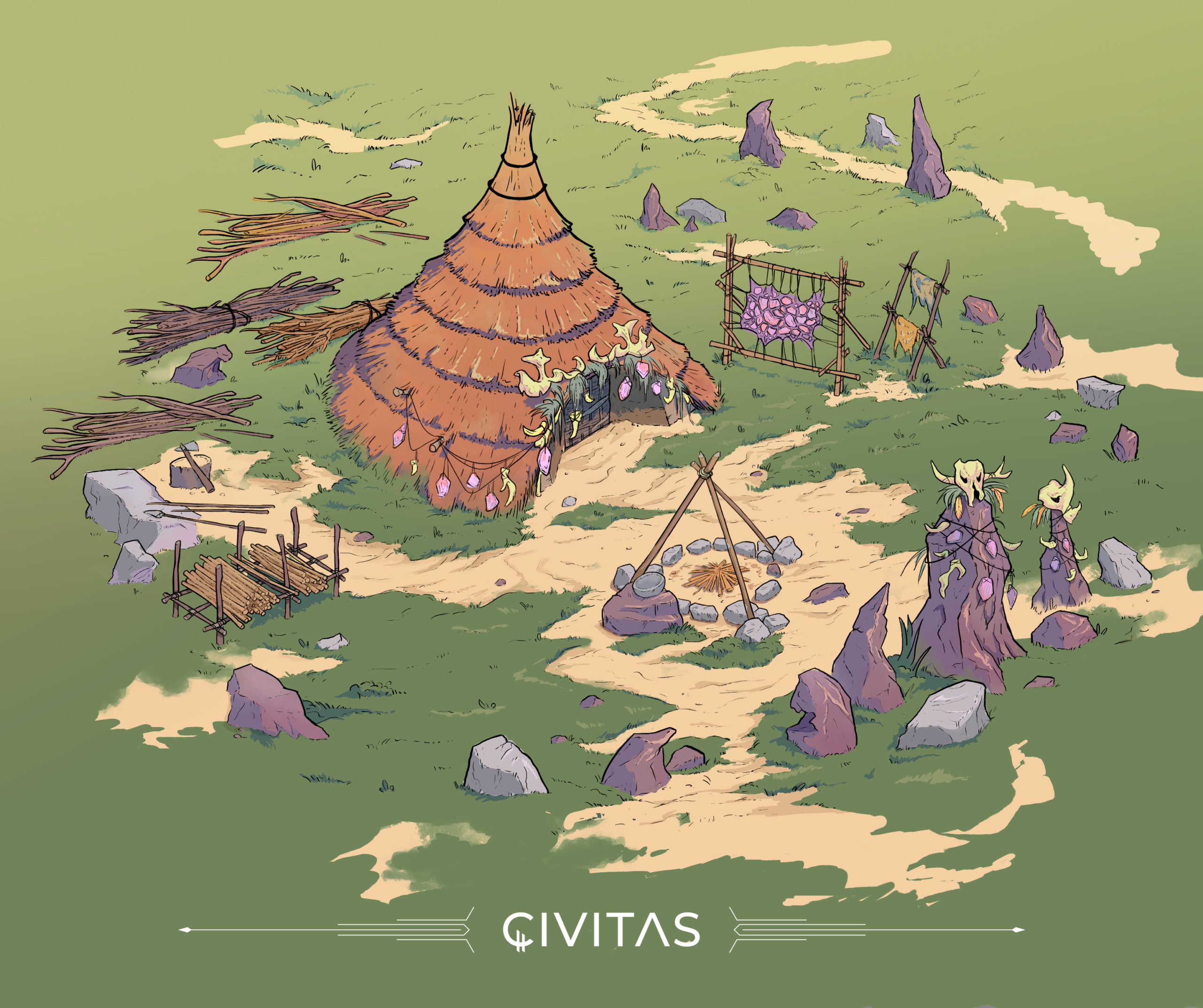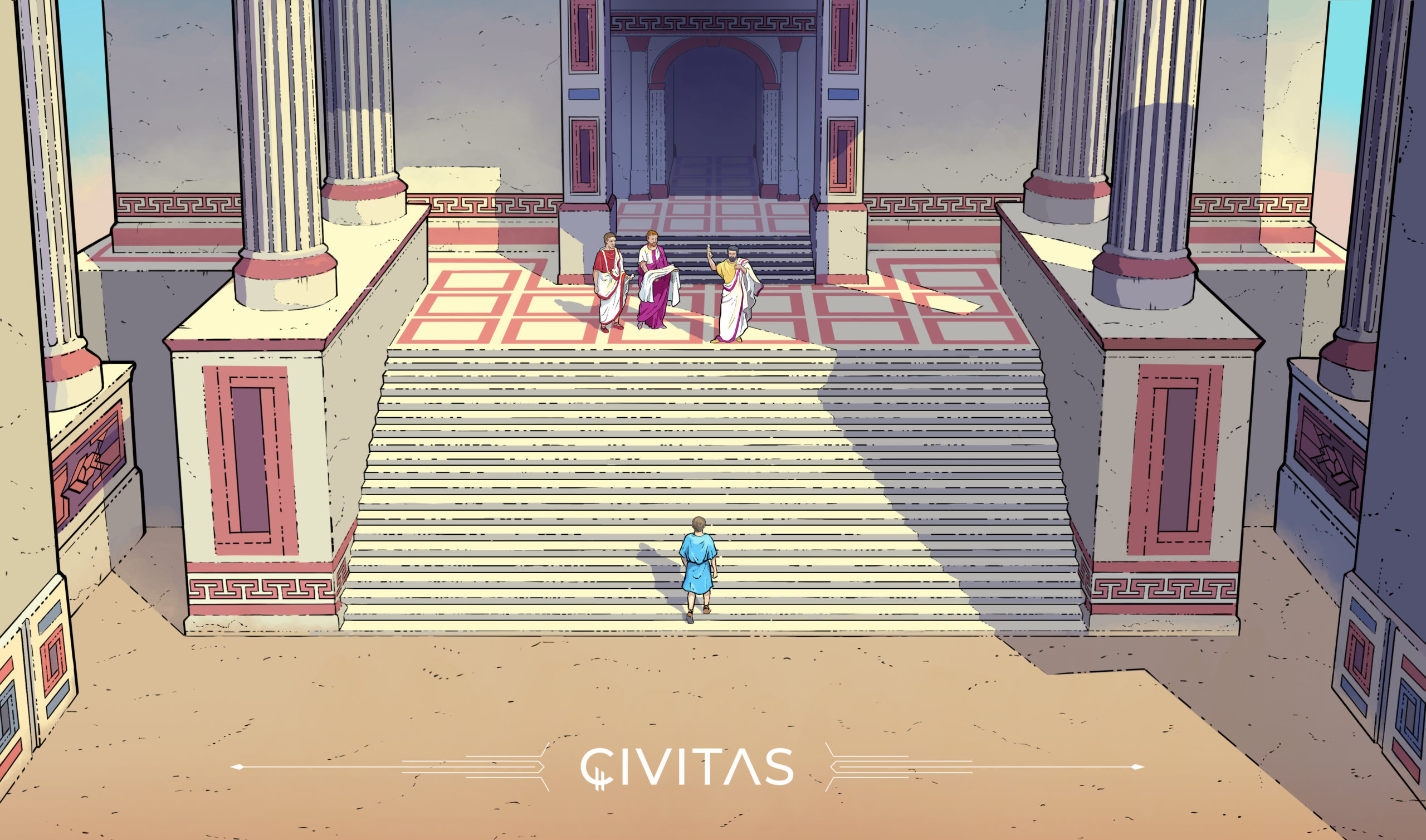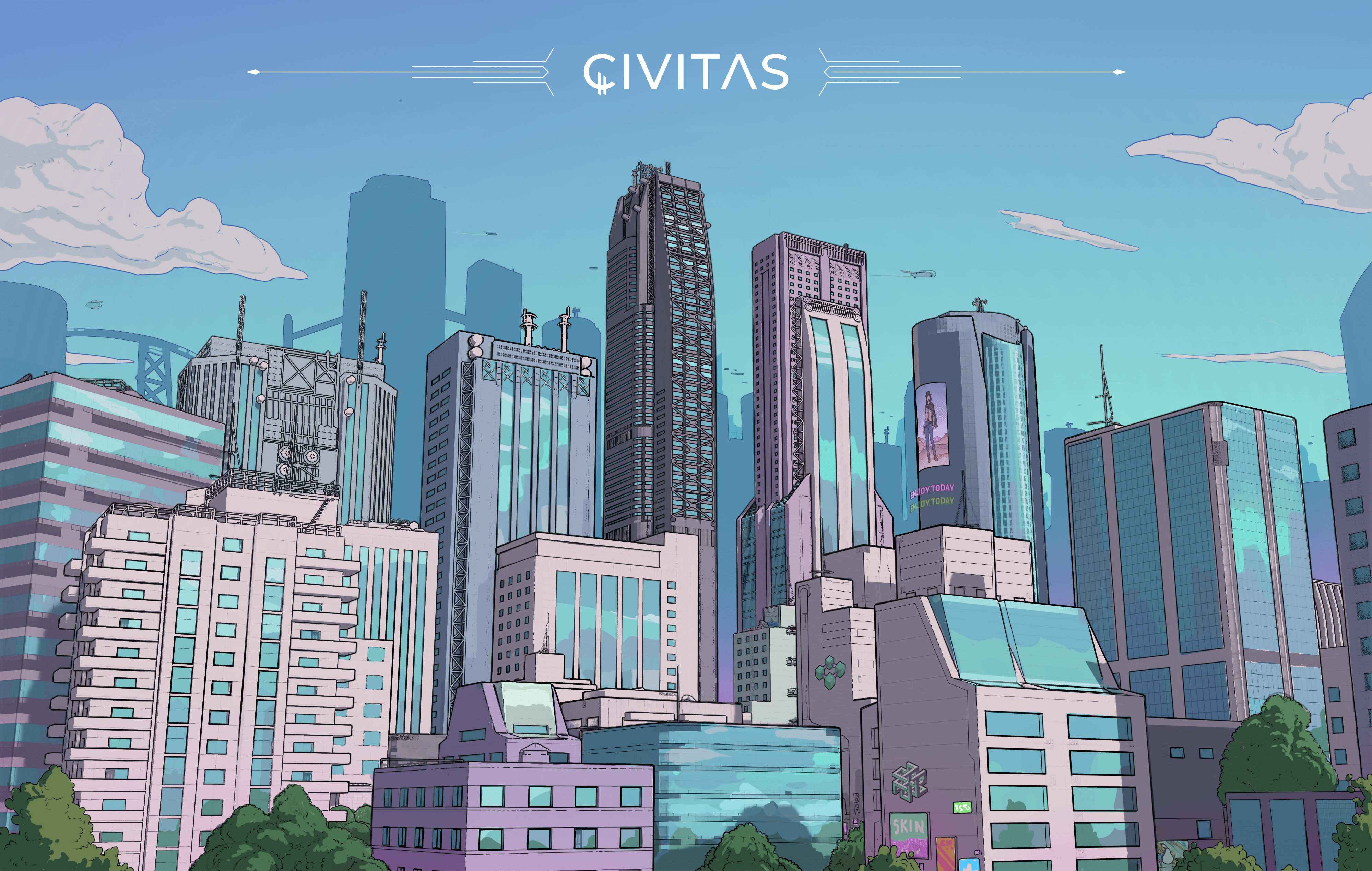Triple-A studio Directive Games lays blockchain foundations with ‘4X’ city builder Civitas

Image supplied to Stockhead by Civitas
Whether mainstream gamers like it or not, the triple-A migration into blockchain gaming is happening, albeit gradually. City builder Civitas has a seriously impressive games-development CV, and looks to be building something special.
Stockhead caught up with Civitas project lead and gaming director Kent Byers to learn about the development of the 4X (eXplore, eXpand, eXploit, and eXterminate) Ethereum-based strategy game, and how it plans to fit into the blockchain-gaming landscape.
What is Civitas? And who’s building it?
Hi Kent. Civitas… give us the elevator pitch, please. What is it, in a sentence or two?
Hi, sure. Civitas is a community-driven, collaborative city-building game that can be played on either PC or mobile. As a part of the 4X strategy genre, it allows players to scout out areas, claim new territories, gather and efficiently use resources in the regions they occupy and collaborate or compete against other players and cities.
It looks like you guys have quite a triple-A gaming pedigree?
Yes, Civitas is built by Directive Games, which is a gaming studio founded in 2014, led by industry veterans from CCP Games, LucasArts, Weta Digital, DICE, Square Enix, Ubisoft and Tencent.
Er, yeah, that’s a pretty decent CV. Go on…
So since 2014, the team’s been building online multiplayer games set in large universes supported by expansive and active communities.
And we also have a pedigree that goes back to the early 2000s with early employees and founders from EVE Online [a vast, space-based MMORPG game] and DICE [of popular first-person shooter Battlefield fame] before it was acquired by EA.
A sneak peek at the dev team of Civitas hard at work on the game 💪
Coming 🔜: more art leaks, development insights, gameplay info, and the first AMA‼️Make sure to have your notification bell on 🔔 and join our Discord community 👉 https://t.co/4hXdLnRk7V pic.twitter.com/AxQD1BVRoS
— Civitas (@playcivitas) April 14, 2022
What are the project’s gaming-based influences?
We’re huge fans of economy-based games, crafting, and other 4X strategy games. Much of our team were early EVE Online (a popular space-based MMORPG game) contributors, which certainly inspires us. We actually have a strategic partnership with CCP Games, which created EVE Online.
Aside from that, I’d say we’ve also been influenced by Civilization and Settlers of Catan – games we love.
We’re excited to put our own stamp on the genre as well, and we believe we’re pioneering many exciting new innovations not seen before in any 4X game to date – either traditional or blockchain-based.

When/where is the game set?
What are the cultural or historical influences you’ve drawn from for the game’s inspiration? What does Civitas mean?
Depending on your dictionary of choice, there are a couple definitions of Civitas, and we feel this one really describes what we wanted to achieve:
“The meaning of CIVITAS is a body of people constituting a politically organized community. ‘citizenship, citizen community.’
This really describes the core approach of our game, which is about community and collaboration in achieving goals that would be virtually impossible to do by any single player.
The time period of the game looks to be spanning ancient civilisations mixed with a modern and futuristic sci-fi feel. Looks vast and nebulous in scope. Is that an accurate assessment?
Yeah, Civitas will span many visual eras based on how well players work together to advance their city. Each city will progress at its own pace given its general capabilities as a DAO, allotment of natural resources, diplomatic skill in trading, cooperating or warring with other cities, etc.
So we will have a lot of crossover with timelines which we think will be a lot of fun. But as a result, we need to make sure we define our visual art direction from the beginning in a manner that spans all eras – past, present, and future.

Art direction
Speaking of art direction, can you tell us a bit about the team’s visual inspirations for the game? The concept art I’ve seen looks superb – shades of Albert Uderzo’s Asterix (but less toony) perhaps?
We wanted to create a style that was interesting, vibrant, and hopefully a bit unique in the industry. I grew up reading Asterix, so possibly on a subconscious level, there is some Uderzo influence.
In the beginning, we looked at Moebius a lot and some European comic artists to capture that artistic and sometimes strange look and feel. Since then, the style has developed to fit the themes of our game better with some influence from Miyazaki and American comics Like Transmetropolitan. However, we are not just copying any style blindly. Instead, we are taking these influences and developing our own unique vision.

I’ve seen examples of some of the animation capabilities shown in Discord [for example, a dancing Viking, see below] and that looks incredible, too. Should that level of animation be expected within the game?
As for the dancing Viking, that’s a case of us just having fun with the characters we’ve made. There is no technical reason we can’t do precisely that in the game, as it’s all done in the engine, but it needs to be a game-design decision first. As for the quality level, we’ll be striving for the utmost quality across the board, which is why we’ve chosen to utilise Unreal Engine 5.
Building a civilization is serious business, but that doesn't mean our creators can't have some fun while animating their characters :stuck_out_tongue: Happy Easter Holidays everyone! pic.twitter.com/7k3XOKY2Ix
— Civitas (@playcivitas) April 15, 2022
Blockchain and the mainstream gaming crossover
What excites you about the blockchain gaming space? What drew you and your team towards it and what excites you about its future?
The majority of our team has been around the gaming industry for a very long time, so we’ve seen many things come and go. It seems clear to developers who have been through many phases that this space is the future in many ways, and it’s not going away.
Can blockchain gaming work hand in glove with traditional gaming?
Yeah, I don’t believe it will get rid of traditional games, just like F2P [free to play] games didn’t kill off console or PC games as people were preaching when F2P was in its infancy. But it’s a space that offers a lot for creative devs, gaming communities, and gamers. I believe it will ultimately be very popular with the next generation of gamers. It’s up to current web2 developers if they want to be a part of that or not.
To me, that’s always been one of the most exciting parts of the games industry, though – it’s an iterative-driven industry that’s constantly evolving. We’re always arriving to make games to reach new players and attempt to create products and worlds that people will enjoy spending their time immersed in.
So how would you describe your approach to building a blockchain game?
When we looked at blockchain space, instead of asking what was wrong with it or what about it we disagreed with, we looked at the aspects of blockchain that inspired us.
And that means the potential of the technology and how we could gamify it, the community engagement and unlocking of the possibility of subDAOs [smaller, autonomous groups within a broader DAO – decentralised autonomous organisations].
And also, generally, tapping into the excitement of using blockchain native tools from sort of this first-principles perspective to create experiences we wouldn’t be able to develop otherwise.
I am excited every day to see what people are building and how passionate they are about the space. How can that not motivate you to just start building?
Khenbish the Hunter
Also known as “nobody” Khenbish is a talented hunter that roams the steppes of northern Asia of old. He is quick as a shadow and the rumour is that he hunts more than game.
join our Discord community to find out more 👉 https://t.co/4hXdLnRk7V pic.twitter.com/yJO3ze3YLB— Civitas (@playcivitas) April 15, 2022
‘What this space needs is more traditional game developers’
Do you think there will be an influx of traditional-gaming space developers such as yourselves looking to build blockchain-based games?
Yep, 100%. There are a lot of developers interested in blockchain. This was evident at the latest GDC [Game Developers Conference] just by how many people were lining up to attend, listen, and debate any blockchain talk.
We know many great teams and studios moving slowly into the space but choosing to stay more in stealth until they feel they are more product ready and watching the public opinion in this space.
There’s been a fair bit of criticism of crypto and NFTs from mainstream gamers, hasn’t there. What’s your take on that?
Yeah – lot of criticism in the space comes from the lack of good games and questionable motives by the teams behind some of the projects.
We truly believe what this space needs is more traditional game developers to come into it and do what they do best and build great games. It will take time, but if more solid games developers can move into the space and focus on making good games, it will be good for the industry as a whole.
Civitas #ArtLeak — Zola the Warrior
Zola is a fierce warrior from one of the first civilizations in the south of Africa.First seen on our Discord 👉 https://t.co/4hXdLnRk7V pic.twitter.com/bihpyZy8eL
— Civitas (@playcivitas) April 16, 2022
Competitive edge, in-game earning and combat
4X gaming is being explored by other AAA hopefuls in the blockchain space (e.g. Star Atlas). What do you think will give Civitas a competitive edge?
I’m excited about seeing other projects in the space. But we don’t really see the moment-to-moment experience in Civitas being the same as other projects we’ve seen so far.
What inspired us about the crypto space was the sense of community and people wanting to do things together, but we noticed that games out there don’t really bring people together. And this is something we feel sets us apart. We’re building Civitas from the ground up with the mindset of collaboration and community participation.
I expect a game of this complexity will provide various ways to play and earn the game’s currency and governance token CITI. Can you tell us some of the ways players might be able to do that?
Yeah, there will be lots of ways to earn. Owning land, farming passive resources, completing individual and community quests, exploring, harvesting, crafting, renting, completing minigames, and participating in community events, to name a few. SubDAOs will also have specific community-based methods of providing their community’s yield.
Could you describe any different scenarios or paths that players might take in the game?
We’ve designed the game from the perspective of wanting to build a framework and an environment and then allowing play to develop in any way players choose. Part of this design philosophy comes from our collective EVE background.
So, we believe in emergent gameplay – giving players the tools and the environment and allowing them to explore how things can work together to create the experiences they want to have or that maybe no one knew was possible. We think this is where the magic happens, and we’re excited to see what the community will do with the world we provide.
That said, there are many concrete paths players and communities will be able to take. This will only be limited by the imagination of the community.
Will Civitas have a combat, or city-raiding element?
PvP [player vs player] is a very contentious subject. It’s a mechanic that can definitely split a community if it’s not implemented correctly.
But we’ll definitely have PvP elements, certainly in our minigames, but as it relates to Civitas in general, our approach to it will be more community based. It won’t be a singular player attacking other players. Ours is city vs city, which also goes back to our core mechanic of community and collaboration. Players will need to work together to supply the war machine for a city to protect and secure what they believe is theirs or to acquire what they want.
We’re also designing PvP to be less punishing. We aren’t into the idea of a city being fully raided and players waking up to everything gone and burned to the ground to where they feel like quitting! We want clear incentives, goals, and motivators for it.
Civitas #ArtLeak — Ívar Loðfótur
A berserker and a Týr worshipper on Psilocybin with a protective blood rune. He’s a part of the Uppsala Úlféðnar cult.First seen on Discord 👉 https://t.co/4hXdLnRk7V pic.twitter.com/vwZi9z023r
— Civitas (@playcivitas) April 16, 2022
Play AND earn, augmented reality and the metaverse
Play to earn has largely been the story of blockchain gaming so far, but the AAA narrative is building with lush-looking worlds and deeply considered gaming mechanics. Do you think Civitas can help lead the play and earn era? That is, fun first, earning second?
Well, we aren’t having these kinds of talks internally about trying to lead that, or be categorised as AAA. But we have a vision for a game that we think is very compelling and fun, and we’re working hard to make sure this game hits our expectations and what the community overall has been asking for, which is a game with a deeper, more compelling game design and more substance.
Overall, I believe that it’s time that we start to see the quality bar of games in this space increasing, and I have seen a lot of developers who feel the same way. We are here for that same mission, and I think the community will be excited by what’s coming.
There’s an AR [augmented reality] element to Civitas that sounds pretty unique. How will that work? Will it involve discovering/finding NFTs for example?
Our AR system is something we’ve been working on for many years, and we’re really excited to implement it in Civitas.
It’ll have many applications – from viewing the game to discovering resources, experiences, and minigames all around you in physical space and utilising geolocation technology. We’ll have much more to reveal around this in the months to come.
How will Civitas fit within the concept of “the metaverse”? Will there be plans to integrate or link with other metaverse games or vast blockchain worlds?
We have some ideas on ways people can bring in their existing NFTs and showcase them in different ways within Civitas, but it’s a bit too early to talk about some of these plans.
We’re starting to talk with other projects about crossover integration and will continue to have more of these partnership discussions going forward.
Civitas #ArtLeak — C-47
A "Machine elves" clan member with ThunderCatz™ arm mods and cyber legs.First seen on Discord 👉 https://t.co/4hXdLnzJgn pic.twitter.com/pM2AdV6cUw
— Civitas (@playcivitas) April 17, 2022
Big backers, passive income, guilds and subDAOs
You have some big partners and notable VC backers, such as Three Arrows Capital and the Warwick brothers (Illuvium), for instance. Have you taken advice from anyone in particular within the space already about tokenomics and building a sustainable token economy?
It’s essential to have a vision of how you want things to work first, and we’re lucky to have multiple decades of experience building economies, but we’ve definitely been fortunate to have a lot of excellent partners who have been involved with our designs to make sure we’re building a sustainable economy.
Yeah, our partners that you mentioned, along with Delphi Digital, CCP Games, 32-Bit, Framework, and lots of our other tier 1 partners – they’ve all been helpful in this regard.
Grata civium and welcome to Civitas, future citizens! We couldn't be more excited to announce our $20M raise co-led by @Delphi_Digital and 3AC to create the future of community-based 4X gaming.
A bit about us🧵👇 pic.twitter.com/BrbWV2QVbL
— Civitas (@playcivitas) April 12, 2022
Will Civitas be able to make players passive income, even when they’re not playing the game?
Yep, there will definitely be opportunities for passive income, including staking, but there will be exponentially greater opportunities for active participants.
And will there be a “scholars” and/or rental element to Civitas that involve gaming guilds?
We have some great guilds as strategic partners like Merit Circle, YGG, and YGGSEA. We still have work to do on our end to flesh out the design around these kind of features.
We believe making sure a game is as accessible as possible is the first step, but making sure players have control of their own assets is also vital.
Can you tell us about the importance of subDAO cities and communities and how these will form? Will the guilds you’re partnering with be a part of this?
SubDAOs are extremely important, and we feel this will create a large amount of emergent content within Civitas.
Players who acquire land within a city will get an NFT which grants them citizenship in that city. This will act as their gateway to many community portals where you can interact, strategise, and get to know your fellow citizens in that city.
First, players will need to elect their “Jus Honorum”, a council that acts as a government representative for the people to help with specific issues. These NFTs also ask as your subDAO governance token to vote on essential development matters within your city. There’s a lot more to go into this, and we’ll be covering this in specific AMAs on our Discord server.
Guilds will be able to participate, but it’s important to note that no single group is in control of a city itself – it’s all owned collectively by the players who make up the subDAO, and they need to all work together to find ways to achieve success.
1/3 Molly O’Connell AKA The Sapphire. Irish immigrant that moved to California during the goldrush. A deadly bounty hunter that started out as a burlesque dancer. It just so happens that the founder of #WorldBurlesqueDay goes by the name Sapphira, who said: (continues) pic.twitter.com/9S1NVw0V3t
— Civitas (@playcivitas) April 26, 2022
GameFi roadblocks and the Civitas road ahead
What challenges do you see in the GameFi sector at present? And ahead for Civitas?
There are many challenges ahead for the sector… Global-macro uncertainty, regulatory and compliance issues, combatting traditional gaming perspectives of the space such as ESG concerns and NFTs as scams and cash grabs, pushback from big publishers, and entrenched industry players disallowing games on their platforms, etc.
But as far as the games themselves, I think getting decentralised governance and play-and-earn mechanics right and making sure we’re building games and worlds worth spending time in are our biggest challenges, and ones definitely worth our focus.
gm! the recording of the first ever Civitas #AMA is now available on YouTube 👇https://t.co/X4mnVHbPru
— Civitas (@playcivitas) April 27, 2022
Lastly, what’s coming up for Civitas, and what’s exciting you most about the project and what lies ahead?
We’re very excited about creating a world that people are eager to spend time in and a place where people can have unique experiences and meet new friends and family.
We’re also excited about continuing to engage and grow with our incredible community. I think, ultimately, that’s what will set us apart. We love our community and want them involved from the beginning. We have many community AMAs [e.g. see above] and events planned, so we’re very excited about that.
As far as what lies ahead, we welcome anyone to join us on Discord and find out, and help build the future of Civitas together.
Civitas is currently in the very early stages of development. So early, in fact, that the roadmap has yet to be published and hotly anticipated CITI token whitelist details have yet to be announced.
You can, however, learn more about the project on its website, in its whitepaper and by following it on Twitter and joining its Discord group.
This Q&A was lightly edited for clarity. The views, information, or opinions expressed in the interview are solely those of the interviewee and do not represent the views of Stockhead.
Stockhead has not provided, endorsed or otherwise assumed responsibility for any financial product advice contained in this article.
Related Topics
UNLOCK INSIGHTS
Discover the untold stories of emerging ASX stocks.
Daily news and expert analysis, it's free to subscribe.
By proceeding, you confirm you understand that we handle personal information in accordance with our Privacy Policy.








